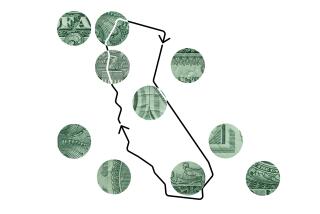Senator Placed Growing Assets Into Blind Trust Run by Best Friend
- Share via
When Pete Wilson announced his mayoral candidacy in San Diego nearly two decades ago, he made a point of disclosing all of his belongings.
“I own an equity in my home, some books and some furniture. . . . I have a bank loan of $3,400. That’s it,” Wilson said during a speech. “Neither Betty nor I own any other real property, business or interest in any company located in or doing business with the city.”
Throughout his political career, Wilson often has boasted about his extraordinary efforts to steer clear of any appearance of a conflict of interest. This led him in December, 1986, to put his assets--which have grown considerably since he first ran for mayor--into a blind trust, making him one of 21 senators to entrust his investments to an independent administrator.
Wilson said he did not have the need to establish a blind trust while he was mayor. He decided to take this step shortly after he abstained from a Senate vote affecting the beer industry because his second wife held extensive stocks in Anheuser-Busch Inc.
To administer the trust, Wilson selected his best friend and former law partner from San Diego, John Davies. A former Wilson political appointee, Davies had arranged for two wealthy friends to provide rent-free apartments to the former San Diego mayor in the early 1980s when Wilson’s marriage to his first wife, Betty, was ending.
The purpose of a blind trust is to allow an independent third party to handle a public official’s assets without informing that official of the investment portfolio. That way, potential conflicts are avoided. The investments are also shielded from public scrutiny.
A public official who appoints his best friend as administrator has created “a visually impaired trust,” said Lawrence J. Ross, a Washington tax lawyer and former chief counsel of a House Ways & Means subcommittee who is familiar with blind trusts. “It doesn’t seem like it fulfills its function if the politician can’t say that the trustee is truly independent. It’s not a legal question. It just doesn’t look right.”
Wilson said he sees no problem having the trust administered by his best friend. He insisted that Davies would not jeopardize his career as a lawyer by discussing financial details with the senator.
“Yes, he’s my dear friend. On the other hand, he’s not a goddamned fool,” Wilson said. “I wouldn’t ask him to do anything like that. He wouldn’t do it if I did.”
Before he married his second wife, Gayle, Wilson had accumulated few private investments and little wealth, according to his tax returns and financial disclosure statements.
Between 1977 and 1981, his annual income fluctuated from $46,860 to $102,284 to $45,404, largely the result of his first wife’s commissions as a real estate agent.
The only significant investment made by Wilson and his first wife was the 1980 purchase of a share in a firm trying to convert cow dung into methane gas. The $10,000 investment helped the Wilsons avoid paying any federal income tax in 1980 despite earning $71,342. Wilson did not claim any deductions further after the tax shelter became an issue in his 1982 Senate race. He paid back taxes when the deduction was disallowed, said campaign director Otto Bos.
Nearly all of Wilson’s current wealth--estimated at about $850,000--comes from his second wife. The value of the blind trust in March was reported at $295,302. In addition to his $101,400 salary, Wilson has collected about $200,000 in speaking fees since he was elected to the Senate in 1982--a controversial source of income because the money often comes from special interest groups and goes directly into the recipients’ pockets. Like many members of Congress, Wilson has given a portion of his honorariums to charities.
Among the companies that have paid Wilson $2,000 speaking fees-- the maximum allowed under federal law--are the National Assn. of Homebuilders, Construction Industry Advancement Fund, American Railroads Assn., Securities Industry Assn., California Federal Savings & Loan Assn. and Coast Savings & Loan Assn.
More to Read
Get the L.A. Times Politics newsletter
Deeply reported insights into legislation, politics and policy from Sacramento, Washington and beyond. In your inbox twice per week.
You may occasionally receive promotional content from the Los Angeles Times.










